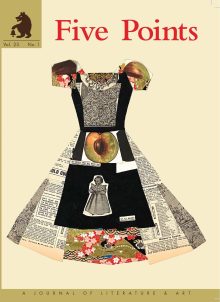Five Points Vol. 23, No. 1
SpringSample Content
Abbie Martin Greenbaum
No Grown-Ups
After more than ten years of not talking about them, he finally brought them up one night at drinks.
Hudson almost never went out with the others after work—he was introverted in the best of times, and after the closing shift he always longed for home—but on this particular night, he decided to tag along.
He waited for an appropriate window in the conversation, and when it opened it was clumsy—Sasha had been saying something about local politics. But this was why he had come; he wanted to talk about them. “You know, I’ve actually lived here since I was fourteen,” he said.
He felt a little thrill, watching the shock volley across their faces. Three years of working together, and none of the people at the table had known where he was from. Though not as good an actor as his friends, Hudson had mastered the performance of invisibility.
“And you stayed?” asked Eileen, at the same time as Sasha said, “How come we never met? How old are you?”
“Actually,” he said, “We might have met. Or you might have seen me.” Six of them had squeezed into the booth, and he struggled to shift his body so that he could look at Sasha.
“Where?” she asked, leaning forward.
He ducked his head and answered into his water glass.
“Did you ever go to any of the Ever Creek High School Theater Company shows?” Sasha gasped.
“Oh my God, you were in that? Holy shit.” She looked around the table. “You guys don’t understand,” she said, shaking her head at their skeptical faces. “It sounds stupid, but that group was legendary. They used to put on all these shows at this barn out in the woods. My brothers took me to see them when I was like, a little kid.” She grinned at Hudson. “Wow, you must be old.”
Hudson ignored this comment and braced himself. He could feel the words she was about to say, gathering like a storm.
“Does that mean . . . do you know Jesse Sterling?’
There it was.
“Hold on,” said Paul, his voice too loud in Hudson’s ear, “He’s from here?”
“Oh yeah,” Sasha said. “I remember seeing him perform.” She was stretched halfway across the table now, her dark sleeves decorated with errant breadcrumbs. “Were you guys friends?”
“Kind of, yeah. He was a few years older than me though,” Hudson said, and then because he couldn’t help it—the brag felt right at his fingertips, “I think he was the one who asked me to join, actually.” He had never found out who had chosen him. But it could have been true.
“Wait,” Sasha said, “How come I don’t remember you, then?”
“I never had any big roles. Also, the company ended in the middle of my first year here,” Hudson said.
“Oh yeah,” Sasha said. “Wasn’t there some crazy fight? Between—”
“Yep,” Hudson said, his heart humming around the edge of panic. He did not want to get into all that (and not only because he did not know, even now, what had happened). This was the nice thing about saving the memories for special occasions, taking them out like the fine china. He could leave behind the pieces that did not fit on the pedestal in his head.
“Want to see a picture?” he asked.
“Of young Jesse Sterling?” Eileen squealed. “Yes, yes we do.”
He pulled out his phone. “Here, this is a good one,” he said, as if he and the photo had crossed paths by coincidence, rather than design. He could feel the meat of his face growing warm. “Look. Here we all are.”
They passed the phone around, oohing and aahing and leaving their greasy fingerprints all over the screen.
Hudson did not have to look at the photo—he had the image memorized. Jesse, Ethan, and Lucy, center stage. The director and her stars. And the rest of the Company, clustered around them, smiling their opening night smiles. You would have had to zoom in to spot Hudson, hidden in the corner of the back row—his right arm reaching for Kathy, who leaned away from him towards the rest of the group.
Sasha started to tell the story of a Company production, one from before Hudson’s time. He stopped listening. Already the fun of the evening had run out, and he remembered why he did not like to go out with the others. He could not stand casual acquaintance Sasha Peterson having access to parts of the story that would always pre-date him.
“Be right back,” he said, shimmying out of the booth.
He locked himself in the bar’s tiny bathroom, leaned against the back of the door. His palms tingled. It was like those times were an island, and every time he rowed his mind close enough to climb ashore, he blinked and saw he had misjudged the horizon. Tonight’s experiment had failed. He did not want to talk about the Company anymore.
By the time he returned to the table, someone had put his phone back beside his glass. They had moved on to other topics. He relaxed; it was over.
But when everything began to unspool, two months after that night, he had to wonder if he’d brought it on himself. If saying the name had been like uttering a curse. Maybe that was too magical of an idea, but then again, everything about the Ever Creek High School Theater Company had always been a little bit magical. . .

